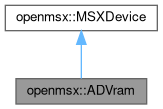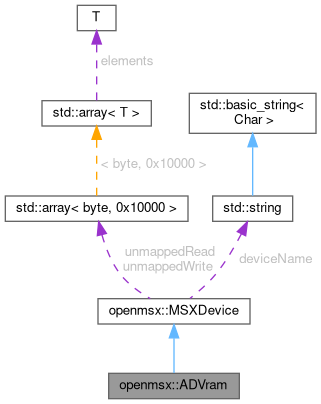Implementation of direct cpu access to VRAM. More...
#include <ADVram.hh>


Public Member Functions | |
| ADVram (const DeviceConfig &config) | |
| void | reset (EmuTime::param time) override |
| This method is called on reset. | |
| byte | readIO (word port, EmuTime::param time) override |
| Read a byte from an IO port, change mode bits. | |
| void | writeIO (word port, byte value, EmuTime::param time) override |
| Write a byte to a given IO port, set mapper register. | |
| byte | readMem (word address, EmuTime::param time) override |
| Read a byte from a location in the video ram at a certain time. | |
| void | writeMem (word address, byte value, EmuTime::param time) override |
| Write a given byte at a certain time to a given location in the video ram. | |
| template<typename Archive > | |
| void | serialize (Archive &ar, unsigned version) |
 Public Member Functions inherited from openmsx::MSXDevice Public Member Functions inherited from openmsx::MSXDevice | |
| MSXDevice (const MSXDevice &)=delete | |
| MSXDevice (MSXDevice &&)=delete | |
| MSXDevice & | operator= (const MSXDevice &)=delete |
| MSXDevice & | operator= (MSXDevice &&)=delete |
| virtual | ~MSXDevice ()=0 |
| const HardwareConfig & | getHardwareConfig () const |
| Returns the hardwareconfig this device belongs to. | |
| void | testRemove (std::span< const std::unique_ptr< MSXDevice > > removed) const |
| Checks whether this device can be removed (no other device has a reference to it). | |
| virtual byte | readIRQVector () |
| Gets IRQ vector used in IM2. | |
| virtual void | powerDown (EmuTime::param time) |
| This method is called when MSX is powered down. | |
| virtual void | powerUp (EmuTime::param time) |
| This method is called when MSX is powered up. | |
| virtual const std::string & | getName () const |
| Returns a human-readable name for this device. | |
| virtual void | getNameList (TclObject &result) const |
| Returns list of name(s) of this device. | |
| void | getDeviceInfo (TclObject &result) const |
| Get device info. | |
| void | getVisibleMemRegion (unsigned &base, unsigned &size) const |
| Returns the range where this device is visible in memory. | |
| virtual byte | peekIO (word port, EmuTime::param time) const |
| Read a byte from a given IO port. | |
| virtual const byte * | getReadCacheLine (word start) const |
| Test that the memory in the interval [start, start + CacheLine::SIZE) is cacheable for reading. | |
| virtual byte * | getWriteCacheLine (word start) |
| Test that the memory in the interval [start, start + CacheLine::SIZE) is cacheable for writing. | |
| virtual byte | peekMem (word address, EmuTime::param time) const |
| Read a byte from a given memory location. | |
| virtual void | globalWrite (word address, byte value, EmuTime::param time) |
| Global writes. | |
| virtual void | globalRead (word address, EmuTime::param time) |
| Global reads. | |
| void | invalidateDeviceRWCache () |
| Calls MSXCPUInterface::invalidateXXCache() for the specific (part of) the slot that this device is located in. | |
| void | invalidateDeviceRCache () |
| void | invalidateDeviceWCache () |
| void | invalidateDeviceRWCache (unsigned start, unsigned size) |
| void | invalidateDeviceRCache (unsigned start, unsigned size) |
| void | invalidateDeviceWCache (unsigned start, unsigned size) |
| void | fillDeviceRWCache (unsigned start, unsigned size, byte *rwData) |
| Calls MSXCPUInterface::fillXXCache() for the specific (part of) the slot that this device is located in. | |
| void | fillDeviceRWCache (unsigned start, unsigned size, const byte *rData, byte *wData) |
| void | fillDeviceRCache (unsigned start, unsigned size, const byte *rData) |
| void | fillDeviceWCache (unsigned start, unsigned size, byte *wData) |
| MSXMotherBoard & | getMotherBoard () const |
| Get the mother board this device belongs to. | |
| const XMLElement & | getDeviceConfig () const |
| Get the configuration section for this device. | |
| const DeviceConfig & | getDeviceConfig2 () const |
| const Devices & | getReferences () const |
| Get the device references that are specified for this device. | |
| EmuTime::param | getCurrentTime () const |
| MSXCPU & | getCPU () const |
| MSXCPUInterface & | getCPUInterface () const |
| Scheduler & | getScheduler () const |
| MSXCliComm & | getCliComm () const |
| Reactor & | getReactor () const |
| CommandController & | getCommandController () const |
| PluggingController & | getPluggingController () const |
| LedStatus & | getLedStatus () const |
| template<typename Archive > | |
| void | serialize (Archive &ar, unsigned version) |
Additional Inherited Members | |
 Public Types inherited from openmsx::MSXDevice Public Types inherited from openmsx::MSXDevice | |
| using | Devices = std::vector< MSXDevice * > |
 Static Public Attributes inherited from openmsx::MSXDevice Static Public Attributes inherited from openmsx::MSXDevice | |
| static std::array< byte, 0x10000 > | unmappedRead |
| static std::array< byte, 0x10000 > | unmappedWrite |
 Protected Member Functions inherited from openmsx::MSXDevice Protected Member Functions inherited from openmsx::MSXDevice | |
| MSXDevice (const DeviceConfig &config, std::string_view name) | |
| Every MSXDevice has a config entry; this constructor gets some device properties from that config entry. | |
| MSXDevice (const DeviceConfig &config) | |
| virtual unsigned | getBaseSizeAlignment () const |
| The 'base' and 'size' attribute values need to be at least aligned to CacheLine::SIZE. | |
| virtual bool | allowUnaligned () const |
| By default we don't allow unaligned <mem> specifications in the config file. | |
| virtual void | getExtraDeviceInfo (TclObject &result) const |
| byte | getPrimarySlot () const |
 Protected Attributes inherited from openmsx::MSXDevice Protected Attributes inherited from openmsx::MSXDevice | |
| std::string | deviceName |
Detailed Description
Implementation of direct cpu access to VRAM.
ADVram (Accesso Direito à Vram is a rare hardware modification that allows the CPU to access the video ram in the same way as ordinary ram.
Constructor & Destructor Documentation
◆ ADVram()
|
explicit |
Member Function Documentation
◆ readIO()
Read a byte from an IO port, change mode bits.
The planar bit and possibly the enable bit are set according to address lines that are normally ignored for IO reads. Returns 255.
Reimplemented from openmsx::MSXDevice.
◆ readMem()
Read a byte from a location in the video ram at a certain time.
If the device is enabled then the value returned comes from the video ram, otherwise it returns 255.
Reimplemented from openmsx::MSXDevice.
Definition at line 70 of file ADVram.cc.
References openmsx::VDPVRAM::cpuRead().
◆ reset()
|
overridevirtual |
This method is called on reset.
Reset the mapper register and the planar bit, if the device is configured with an enable bit then that bit is reset as well.
Reimplemented from openmsx::MSXDevice.
Definition at line 35 of file ADVram.cc.
Referenced by ADVram().
◆ serialize()
| void openmsx::ADVram::serialize | ( | Archive & | ar, |
| unsigned | version | ||
| ) |
◆ writeIO()
◆ writeMem()
Write a given byte at a certain time to a given location in the video ram.
If the device is enabled then the write is redirected to the video ram, if it is not, nothing happens.
Reimplemented from openmsx::MSXDevice.
Definition at line 75 of file ADVram.cc.
References openmsx::VDPVRAM::cpuWrite().
The documentation for this class was generated from the following files: